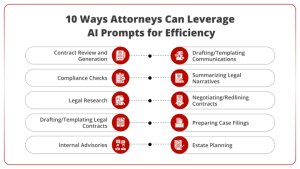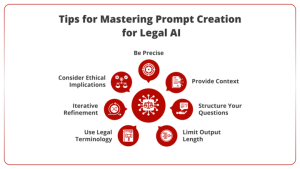It’s true!
Researchers have developed AI systems that can forecast the results of court cases with accuracy rates exceeding 70%. Imagine the implications for legal strategy and case preparation!
AI helps draft legal documents, research precedents, and even recommend negotiation tactics—all in seconds. Law firms around the globe are using AI to do everything from parsing through mountains of legal documents to helping predict the outcomes of litigation with surprising accuracy.
As we apply AI to the legal field, we face serious challenges and ethical questions.
- Can we trust AI’s judgment over a seasoned lawyer’s?
- How do we protect client data when machines are processing it?
- What about AI’s inherent biases?
Remember: with great power comes great responsibility. Using AI in legal practice reshapes our understanding of justice and fairness. Let’s explore how AI transforms the legal field and how attorneys can use AI prompts to enhance efficiency.
Managing these challenges requires continuous learning and staying updated with the latest developments. Attending Destination CLEs conferences gives insight into emerging legal knowledge and connects you with influential industry figures, keeping your practice up-to-date.
AI for Lawyers: Enhancing Efficiency and Client Service
Incorporating AI into law practice can significantly boost productivity and improve client relationships. By automating routine tasks such as due diligence, contract searches, and invoice generation, AI frees up your time, allowing you to focus more on billable work and client interactions.
This efficiency increases your firm’s productivity and reduces the costs associated with legal services, making justice more accessible to your clients. Moreover, with the time saved, you can enhance your client-centered service, build stronger relationships, understand your clients’ needs more deeply, increase trust, generate more referrals, and create a better reputation for your firm.
How to Write Effective AI Legal Prompts for Attorneys?
When creating AI legal prompts or attorney AI prompts, being specific is critical to getting valuable responses.
- Start by defining the role you want ChatGPT to assume, such as acting as your opposing counsel.
- Next, provide detailed context and clearly state what outcome you’re aiming for. For instance, say, “Act as my opposing counsel and provide counterarguments for [legal case].”
- If the initial answers don’t meet your expectations, don’t hesitate to ask follow-up questions or rephrase them for clarity.
- It’s also helpful to request sources to back up the information.
- Always take the time to refine and adjust the AI’s responses to ensure accuracy and relevance to your needs. This approach helps you harness AI’s full potential to enhance legal practice.
10 Ways Attorneys Can Leverage AI Prompts for Efficiency

Lawyers across all specializations can greatly enhance their productivity and service quality by incorporating AI into their daily operations. Here’s how AI can revitalize your legal practice:
Contract Review and Generation
You can spend less time on routine documents like Non-Disclosure Agreements (NDAs) or employment contracts with AI assistance. By automating the drafting and reviewing of these standard contracts, you can redirect your focus to more complex legal tasks that require your direct expertise and insight.
AI Prompt for Drafting,
[Create a draft Non-Disclosure Agreement for a new software development project that includes standard confidentiality clauses, a definition of proprietary information, and the receiving party’s obligations.]
AI Prompt for Reviewing
[Review the attached employment contract and highlight any non-compliant clauses with current California employment law, especially regarding termination and severance provisions.]
AI enhances document review by ensuring no crucial clauses are missed, helping flag potential legal issues early, and providing thorough coverage of simple and complex agreements. This allows for more accurate, proactive, and comprehensive contract analysis.
Compliance Checks
Staying updated with the latest regulations is critical for lawyers in dynamic industries. AI can simplify this process by providing quick summaries of new laws or regulations, helping you ensure compliance without needing extensive documentation. This is particularly useful in healthcare, finance, or technology.
AI Prompt for Regulation Updates
[Summarize recent changes in U.S. HIPAA regulations for healthcare data management and highlight any new compliance requirements for digital health providers].
Legal Research
AI can speed up legal research, whether you’re preparing for litigation or need to review legal precedents thoroughly. Utilizing AI to handle initial research phases allows you to gain insights faster and build your case or defense with a robust foundation.
AI enhances legal research by offering speed, relevance, and depth. It allows you to access comprehensive research findings in a fraction of the time it would take manually. By refining search results based on prompt specificity, AI ensures you receive only the most relevant information.
Additionally, AI’s ability to cross-reference multiple sources simultaneously provides a deeper, more thorough overview of the legal field, helping you make informed decisions faster and with greater confidence.
AI Prompt for Case Law Research
[Identify and summarize all precedent cases concerning breach of contract in the telecommunications sector within the last 10 years.]
AI Prompt for Statutory Research
[Provide a detailed analysis of the state statutes in New York governing digital privacy rights in consumer contracts post-2022.]
Drafting/Templating Legal Contracts
AI can assist in drafting legal contracts by generating document templates tailored to specific requirements. AI enables customization to include state-specific clauses and legal requirements automatically. It scales efficiently, handling a high volume of contracts without sacrificing quality or detail. AI generates drafts in minutes, allowing for rapid turnaround and improved client service.
Prompt Example
[Draft a standard employment contract for a full-time employee in California with a confidentiality clause.]
Internal Advisories
AI can help create clear and comprehensive initial versions when drafting advisories or memos. Starting with an AI-generated document allows you to refine and tailor the content to specific legal requirements or organizational needs, ensuring accuracy while saving time.
AI Prompt for Drafting Memos
[Draft an internal memo to the legal team outlining the implications of the recent Supreme Court decision on copyright laws affecting digital content creators.]
Drafting/Templating Communications
Automating routine communications through AI saves time and ensures consistency across all client interactions. It helps you to quickly produce emails, memos, or letters, reducing the manual effort required for each communication and maintaining a uniform tone and style that reflects your firm’s professionalism.
AI allows you to incorporate specific details pertinent to each case or client, personalizing automated communications without extra effort.
Prompt Example
[Generate a follow-up email to client X providing a case update and next steps.]
Summarizing Legal Narratives
AI can distill extensive legal texts into concise summaries, making it easier to 3grasp the essence of complex documents quickly.
AI saves time by summarizing lengthy documents and highlighting important points and arguments so you can focus on strategy and planning. These summaries are ideal for team briefings or as a foundation for detailed legal strategy.
Prompt Example
[Summarize the critical arguments from the last three filings in case Y.]
Negotiating/Redlining Contracts
AI can play a crucial role in the contract review and negotiation process by automating the identification and modification of contract clauses.
You can input a draft contract into an AI system and use prompts to specify areas of focus. This allows you to prepare more thoroughly for negotiations, ensuring all contractual terms protect your client’s interests and comply with applicable laws. It also speeds up the preparation process, allowing you to handle more cases or contracts simultaneously.
Prompt Example for Initial Review
[Identify any clauses that could pose a risk to client X in this joint venture agreement.]
Prompt Example for Detailed Redlining
[Suggest alternative wording for the non-compete clause in this employment contract to make it enforceable in California.]
Preparing Case Filings
AI’s ability to assist in drafting legal documents extends to complex litigation documents such as pleadings and motions.
AI allows you to start with a base template and customize it with details specific to the case.
This ensures consistency and completeness in initial drafts, reducing the time spent on these tasks. It also helps you focus on refining the strategy and arguments rather than formatting and primary content.
Prompt Example for Drafting Motions
[Generate a motion for summary judgment based on the provided evidence of breach of contract by Company C.]
Prompt Example for Amending Filings
[Update the existing lawsuit filing to include the latest claims of intellectual property infringement.]
Estate Planning
AI tools can be particularly useful in estate planning, where personalized document creation is frequently required.
AI can generate personalized wills or trusts based on specific instructions and client details. This significantly reduces the time it takes to draft customized estate planning documents. It also helps ensure that all legal aspects are covered accurately, providing peace of mind to both the lawyer and the client.
Prompt Example for Complex Estate Planning
[Create a trust plan for an estate with international assets, specifying tax implications for each jurisdiction.]
Prompt Example for Updating Estate Documents
[Revise the existing will to include the latest addition to the client’s asset portfolio.]
Integrating AI into your legal practice streamlines complex tasks and enhances your capacity to handle more significant legal challenges, improving your efficiency and the quality of your client service.
Tips for Mastering Prompt Creation for Legal AI

To effectively use AI tools like GPT-4 in legal practice, follow these seven tips to refine your prompts and improve AI responses:
Be Precise
Always aim for clarity and specificity in your prompts to avoid ambiguous or irrelevant answers. For instance, rather than asking, “Tell me about Roe v. Wade,” refine your prompt to, “Summarize the key legal arguments in the Roe v. Wade case.”
Provide Context
Enhance the relevance of AI responses by setting a clear context for your questions. If you’re dealing with trademark law, you might ask, “In the context of trademark law, explain the concept of ‘likelihood of confusion.’”
Structure Your Questions
Organize your prompts to guide the AI toward the information you need. For example, you could structure a query on contract law as “What are the elements of a valid contract under common law?” You can add bullet points to clarify each element further.
Limit Output Length
To keep responses focused and manageable, specify how long you want the AI’s answer. For example, you could request, “In 50 words, explain the doctrine of stare decisis.”
Use Legal Terminology
Incorporate specific legal terms and keywords into your prompts to ensure you receive precise and accurate legal information. A prompt could be, “Define ‘mens rea’ in criminal law.”
Iterative Refinement
Prepare to refine your prompts based on the AI’s initial responses. This iterative process helps sharpen the question to achieve clearer answers. If a response is too vague, rephrase your prompt with additional details or different wording.
Consider Ethical Implications
Always consider the ethical implications when integrating AI into your legal practice. Ensure that any AI-generated content, especially documents and advisories, adheres to confidentiality and client privilege standards.
Staying Current in Legal Practice: The Role of Continuing Legal Education (CLE)
With AI rapidly transforming the legal field, staying updated on new technologies and their ethical implications is more crucial than ever. AI tools enhance tasks from document review to legal research and introduce unique challenges, such as data privacy concerns and potential biases.
Engaging in continuous learning, especially through CLE programs like Destination CLEs, helps legal professionals stay informed about AI’s latest applications and ethical standards. With travel and accommodations organized for you, Destination CLEs lets you focus fully on learning, networking, and preparing for the future of law.
Earn CLE Credits in the World’s Most Captivating Locations with Destination CLEs
Destination CLEs redefine the way legal professionals meet their continuing education requirements. Our conferences blend educational opportunities with cultural immersion in some of the world’s most captivating cities.
Why Choose Destination CLEs?
- Meet CLE Requirements: Fulfill your mandatory CLE credits through engaging, high-quality seminars in stunning global locations.
- Transformative Learning: Turn the usual lecture-based learning on its head by engaging in sessions as dynamic as the destinations.
- Networking Opportunities: Connect with peers worldwide, expanding your professional network in settings that encourage collaboration and growth.
- All-Inclusive Experience: Enjoy comprehensive packages that cover educational sessions, accommodations, and unique cultural experiences, making your learning adventure seamless and memorable.
- Efficient Credit Earning: Earn required CLE credits efficiently, with schedules that balance professional development and exploration.
Plan your next educational journey with Destination CLEs and ensure extraordinary professional development. Our 2024-2025 lineup includes diverse locales such as Lisbon, Puerto Vallarta, Dubai, Havana, and an Alaska Cruise—each offering a distinct blend of legal education and local culture.
Secure your spot today and become part of a community dedicated to professional growth and networking.
DestinationCLEs.com is a participant in the Amazon Services LLC Associates Program, an affiliate advertising program designed to provide a means for sites to earn advertising fees by advertising and linking to Amazon dot com.












